Do you like wide, open spaces? Enjoy sleeping under the stars? One of the best reasons for choosing a volunteer abroad program in Namibia, a country beloved for its rugged, harsh, yet beautiful landscapes, is because you will be able to live and work in the great outdoors.
The word “Namib” means “vast place,” which is fitting because this is one of the least crowded places on the planet. With desolate mountains, golden deserts with towering dunes, shimmering salt pans, and treacherous Atlantic rollers, Namibia is a country of contrasts.
Wildlife and wild spaces are important to the people of Namibia. It was the first African nation to implement environmental protection into its constitution, and more than 40% of the country is under some type of conservation management plan.
Namibia is also an excellent place to see a big cat, since its home to the world’s largest population of free-roaming cheetahs. It’s a breathtaking sight, but the big cats are threatened in central Namibia, where much of its territory is now used for commercial farming. Free-roaming big cats are top predators and farmers don’t tolerate large carnivores that hunt and kill their livestock.
If you’re interested in working with a conservation program that helps the endangered cheetah, as well as other big cats and wildlife, take a look at Frontier’s Carnivore Conservation Program in Namibia. Work with biologists to track, capture, and relocate carnivores to a safe area. Conservation is also critical to the desert-adapted elephants of Namibia, one of only two desert-dwelling elephant populations in the world!
Water is a premium commodity in Damaraland, an arid section of Namibia. During the rainy season, rivers spring to life and create an ecosystem that’s critical to desert-adapted elephants. The water also is critical to the livelihood of subsistence farmers. When elephants compete with their human neighbors for water, damage ensues and conflict arises. With their keen sense of smell, elephants will locate water and use their strong trunks to pull out pipes, and their tusks to puncture water tanks to get at the source. The result is that these thirsty elephants, labeled as “problem animals,” are shot by farmers. Join African Impact on their Desert Elephant Conservation project mending walls.
Another Namibia volunteer opportunity places you on the Re-wilding Environmental Project with Global Nomadic, where your month-long retreat can be soul-saving as well as land saving. This project allows you to restore original flora and fauna, helping to reclaim Namibia’s “naturescape”.
If any of these projects sound interesting to you and strike a chord in your naturalists’ heart, read on!
Volunteer Opportunities in Namibia
Trending Guidebooks
Volunteering Abroad AFTER the Coronavirus Outbreak
Read 25,944 times2025 Best Internships Abroad: Medical Care, Marine Biology & More
Read 89,652 timesVolunteer in Australia: Animals, Conservation, Ranching and More
Read 49,389 times2025 Best Volunteer Abroad Programs, Organizations, and Projects
Read 3,648,552 times
African Impact places volunteer travelers on programs in 12 countries throughout Africa. Since its founding in 2004, nearly 13,000 people have signed up for its award-winning humanitarian projects. With a goal to create global citizens, African Impact offers volunteer experiences beyond expectation and creates structured and sustainable plans at each project site to meet the needs of the communities and wildlife. Permanent teams work alongside volunteers and interns, ensuring you make positive impacts, friendships, memories, and adventures that you’ll remember forever.
Travel to Damaraland in the Northwest region of Namibia with African Impact and help to save the desert elephant. Your skills are needed to build walls and water dams that allow elephants to drink but keep them from damaging important infrastructure at communal water sources. You also can help with a monitoring program that researchers use to track elephant herd movement and predict where new walls are needed. Another reason this data is needed is to inform community members of the elephants’ whereabouts, alleviating their fear, and letting them safeguard themselves and their water from the giant animals.
You’ll go on patrol, helping to track the various resident herds, taking photographs of elephants to use in identifying individuals, and recording information such as births and deaths. This adventure project puts you into the wild country, camping under the stars. Volunteering highlights include:
- Seeing wild elephants in their natural desert habitat
- Contributing to elephant conservation with physical labor
- Learning bushcraft, such as how to read a map, compass navigation, and using a GPS
- Understanding animal behavior, how to approach a dangerous animal, and bushwalking
- Cooking over a fire, setting up a bush camp, safety, and hygiene in the wild
- Visiting villages and experiencing the culture
- Making friends with other international volunteers
During your first week at base camp, you’ll sleep on a large treehouse platform. Height is needed at basecamp because it has two elephant drinking dams, so these large animals often wander into the area during the evening. You’ll be provided with a bedroll and mattress, but you’ll need to bring a sleeping bag and pillow.
Your second week is spent on patrol, camping in the bush. Your living conditions are basic, and no water is available for bathing. Camping equipment is provided, including folding chairs, some tenting, and cooking utensils. All meals are included, and the food is simple.
Tea and coffee are available at camp. Namibia has much to offer the adventure lover, so after your placement consider adding a week or more to explore this country. You can take a guided tour, a camel ride, or even go skydiving. Try sandboarding down the desert hills, or go quad biking. Nearby, on the coast, there is kayaking, boating, and fishing. Program fees are $1,134 for two weeks. Read more about the project.
For more than 25 years, Frontier has offered dedicated travel experiences in areas of ecosystem protection, wildlife rescue and rehabilitation, economic growth, community development, and capacity building. Founded in 1989, this nonprofit conservation and development NGO partners on more than 400 projects in 72 countries. It is Frontier’s policy to collaborate on sustainable ventures that protect biodiversity. Its origins are in scientific and conservation research, and its mission is to create apolitical, forward-thinking solutions that are community-driven and sustainable.
You can help Frontier’s partners in Namibia as they develop a sustainable conservation plan that avoids human-animal conflict. The Carnivore Conservation program in Namibia places you on a research program monitoring and tracking two of Africa’s big cats alongside biologists in the field.
This project provides hands-on scientific research into the behavior of cheetahs, leopards, and hyenas. You’ll assist with setting and checking box traps and capture of the animals, then help transport them to a remote wildlife release site. You’ll take part in animal counts, tracking and identifying carnivore spoors, and locating trees where cheetahs leave marks. You’ll learn how to locate and process the telemetry tracking data of collared cheetahs and leopards.
If you have a passion for wildlife, and a desire to care for animals, this is a perfect project for you. This project places you at a central Namibia wildlife sanctuary and a nature reserve to the Southwest. Your support at the sanctuary will include helping with daily tasks, including feeding the animals and helping take care of lions, leopards, cheetahs, wild dogs, caracals, meerkats, and sometimes orphaned baby baboons.
You’ll arrive at Hosea Kutako International Airport (WDH) in Windhoek, and be met by a team member, who will drive you to the sanctuary for your project introduction. Accommodations are in a large safari tent with a living room and a shared bedroom area. Electricity and solar-heated showers are available. All meals are included, and program fees start at $2,745 for three weeks.
When your project is finished, stay in Namibia and enjoy some of the unique activities this country has to offer, such as dune surfing in the Namib Desert – an exhilarating rush! See prehistoric rock art, or take a hot air balloon ride. Learn more about the Carnivore Conservation program.
On the Elephant Conservation project with Frontier, you’ll travel to the Northwest region of Namibia, known as Damaraland, to help researchers dedicated to the conservation and alleviating the human-wildlife conflict of desert-adapted elephants. The goals of the project are:
- To find educational and developmental solutions around communal water points so that subsistence farmers and elephants can peacefully live in the same areas
- To contribute scientific research on elephant movements, and compile identikits on herds and individuals
In addition, tourism can contribute to the economy if wild elephants are a draw. Volunteer teams begin their placement on a building project, working with farmers to build walls around their water points, or constructing new water points for elephants, directing them away from homesteads and farms.
The second week of your stay, you’ll go on elephant patrol, assisting the biology staff and researchers as they follow and monitor the movements of the elephants. You’ll be camping in the southern Kunene Region, experiencing life in the bush. Elephants are tracked and data are entered into Frontier’s online database, which links their GPS location into a Google Earth map.
This information allows researchers to monitor the farms and homesteads that require protection of water sources from elephant herds on the move seasonally. Elephants can cause damage to a water source, rendering it unusable by the community for long periods. Frontier works with the community to build walls that allow elephants to drink water, but prevent them from accessing and damaging windmills, storage tanks, and pumps.
Fly into Walvis Bay or Windhoek, and then journey to the town of Swakopmund. Project staff will meet you there and escort you to the project site, three hours away. Accommodations are sparse and in the bush. You’ll be in mobile base camps, staying in two-person tents. Washing facilities are limited, and toilets are long drops (enclosed and private), in one base camp. No showers or toilets are available during your week on elephant patrol. At these times you’ll sleep under the stars on bedrolls with mosquito nets.
All meals are included, prepared on a rotational basis over the open fire. Food is basic, with vegetarian options. Local orientation, training, and in-country emergency support are included in the program fee, which starts at $1,495 for two weeks.
After a week in the bush, you’ll be ready for the coastal oasis of Swakopmund, a great place to park and use as a launchpad for exploring the Namib Desert. Or stay in the city and soak up the culture in cafes, shops, and restaurants. Swim at the jetty, visit the National Marine Aquarium or take in a round of golf at Rossmund Golf Club. Start planning your trip to the bush today!
Global Nomadic, founded in 2009, connects people with life-changing volunteer projects around the world. More than 10,000 people have signed up with Global Nomadic, working in 40 countries on projects ranging from human rights and social sustainability to environmental conservation and wildlife rehabilitation. Global Nomadic also works with young professionals seeking international work placements. Further your career with an internship, a TEFL course, or a research volunteer project.
Sojourn in southern Namibia for a month or more on a remote expedition that offers you an opportunity to understand this unique ecosystem and the species that live within it. The Oana conservancy area is 45,000-hectares in one of the last true wildernesses of Southern Africa. It was purchased for the sole purpose of preserving Namibia’s stunning wildlife.
You’ll participate in a long-standing research project in this semi-arid mountainous desert, home to well-known, iconic animals such as leopards, the caracal, and the honey badger. Other significant fauna includes the hyena, the oryx antelope, the aardvark, the giant kingfisher, and the African black eagle. This project is for all naturalists, incorporating aspects of biology and conservation of flora and fauna, as well as focusing on building leadership skills.
While in-country, you’ll assist with “re-wilding” the area, as it transitions from a livestock/hunting ranch into a protected wildlife area. You’ll regenerate the habitat by clearing trash, removing fences, planting vegetation, creating “vulture restaurants” (depositing carrion for endangered vultures to feed upon), and developing water points for animals. Other project highlights include:
- Helping to eradicate the Prosopis, a highly invasive plant
- Identifying game trails and setting up camera traps
- Learning how to identify individuals in an ongoing leopard survey
- Surveying biodiversity while on three-day horseback missions
- Conducting bird and amphibian surveys at the river
- Learning about bee ecology, bee-keeping, and harvesting a hive yourself
- Relocating and releasing animals, if needed
You’ll also participate in field trips to the world’s second-largest canyon, Fish River Canyon, to track special species. While you’re there, you’ll white-water raft on the Orange River. Accommodations are in a semi-luxurious, bedouin-style tent camp with 24-hour security. Three hearty meals are provided each day, with snacks in between. Wifi is available in town.
In addition to your conservation duties, you can get involved in fun activities during your placement. Try yoga, learn Khwe bushman skills, take cooking lessons, do community work in Warmbad, go mountain biking, fishing, hiking, horseback riding, star gazing, and more. Program fees are $2,452 for five weeks at Oana and include accommodations, food, in-country support, airport pickup, project equipment, and orientation. Start planning your expedition today.
Ready to Travel?
Namibia has much to offer the responsible traveler, but the lesson that will stay with you is the ongoing conflict between humans and the land. Witness this as you walk along the Skeleton Coast, where the shore is littered with the rusting hulks of wrecked ships, powerless in the Atlantic Ocean surf as it crashes relentlessly into the ancient Namib Desert. At 80 million years, it is the oldest desert on Earth.
With your help, ingenuity, and commitment to community development and wildlife conservation, much can be saved of this beautiful land and the endangered animals that live here.













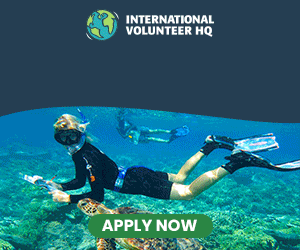
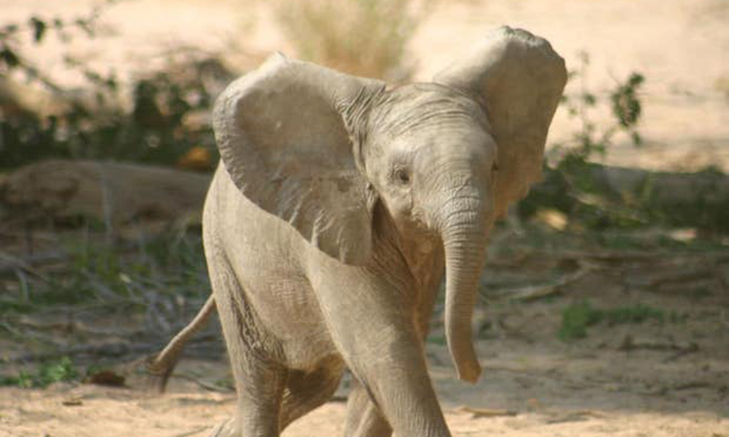

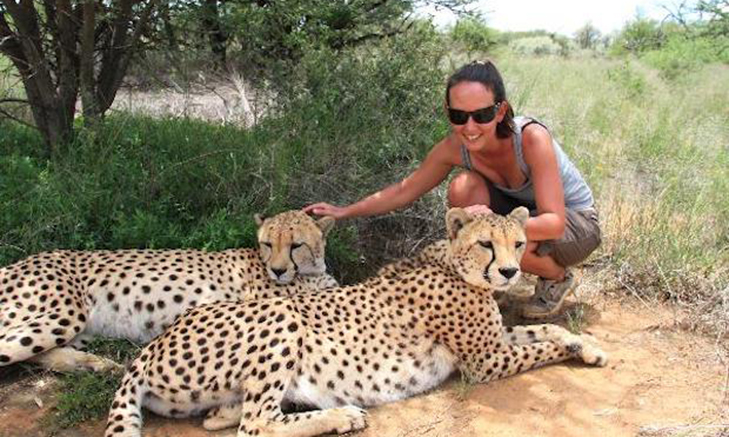

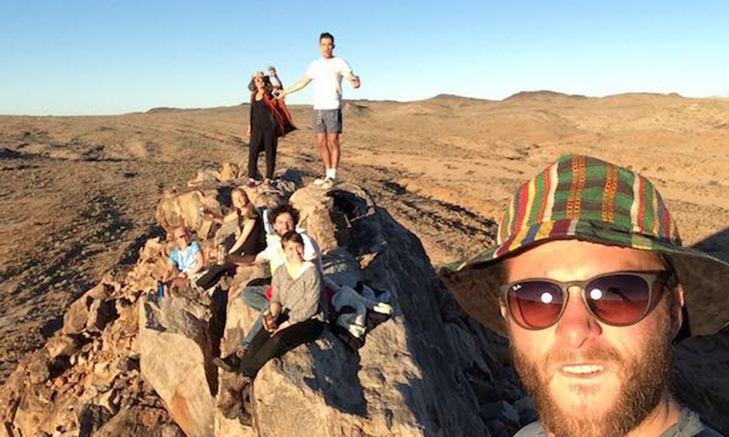

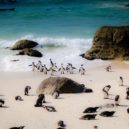
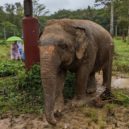
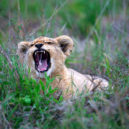
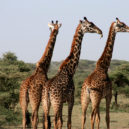






Robin Van Auken · Writer
Robin is a researcher, writer, and a registered professional archaeologist, a skillset she uses every day as a cultural communication specialist with Hands-on Heritage. Her projects connect communities with an emphasis on interpretation and education and conserve cultural and environmental legacies.